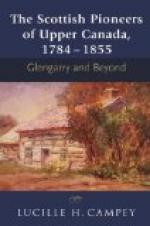“He attributed all our misfortunes to the misconduct of my guides, and the very plan we pursued, by the desire of the Governor, in not taking any women with us on this journey, was, he said, the principal thing that occasioned all our wants. ‘For,’ said he, ’when all the men are heavy laden, they can neither hunt nor travel to any considerable distance; and in case they meet with success in hunting, who is to carry the produce of their labour?’ ‘Women,’ added he, ’were made for labour; one of them can carry, or haul, as much as two men can do. They also pitch our tents, make and mend our clothing, keep us warm at night; and, in fact, there is no such thing as travelling any considerable distance, or for any length of time, in this country, without their assistance.’ ‘Women,’ said he again, ’though they do everything, are maintained at a trifling expense; for as they always stand cook, the very licking of their fingers in scarce times is sufficient for their subsistence.’
“This,” added Hearne, “however odd it may appear, is but too true a description of the situation of women in this country: it is at least so in appearance; for the women always carry the provisions, though it is more than probable they help themselves when the men are not present.”
On the 7th of December, 1770, Samuel Hearne started again from Prince of Wales’s Fort, Hudsons Bay, but under very much happier circumstances, Matonabi being practically in charge of the expedition.
Unfortunately, on reaching the Egg River, where Matonabi’s people had made a cache or hiding place in which they had stored a quantity of provisions and implements, they found that other Indians had discovered this hiding place and robbed it of nearly every article. This was a great disappointment to Matonabi’s people; but Hearne remarks the fortitude with which they bore this, nor did one of them ever speak of revenge. But the expedition’s scarcity of food obliged them to push on from morning till night, day after day; yet the road being very bad, and their sledges heavy, they were seldom able to do more than eighteen miles a day. Hearne himself writes that he never spent so dull a Christmas. For the last three days he had not tasted a morsel of anything, except a pipe of tobacco and a drink of snow water, yet he had to walk daily from morning till night heavily laden. However, at the end of December they reached Island Lake, where they entered a camp of Matonabi’s people, and here they found a little food in the way of fish and dried venison. From Island Lake they made their way in a zigzag fashion, stopping often to drive reindeer into pounds to secure large supplies of venison and of skins, till, in the month of April, 1771, they reached a small lake with an almost unpronounceable name, which meant “Little Fish Hill”, from a high hill which stood at the west end of this sheet of water.




